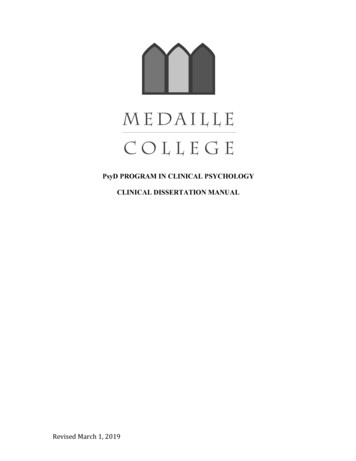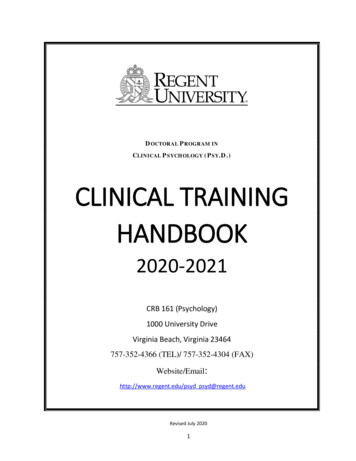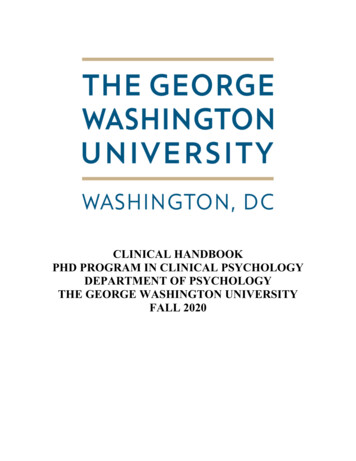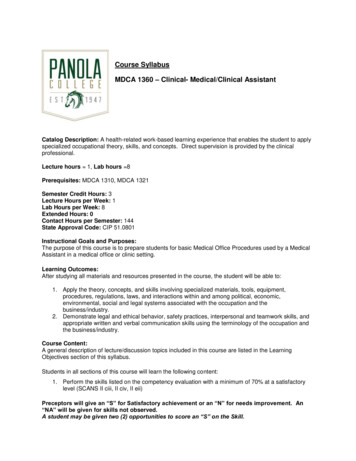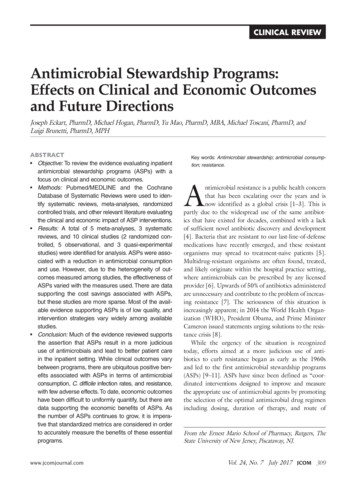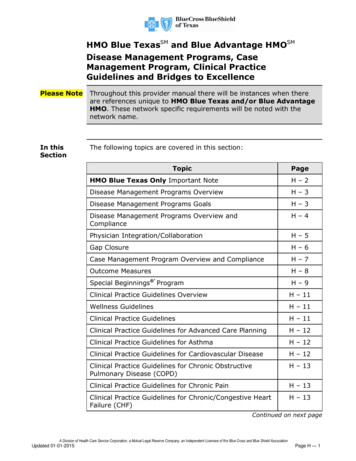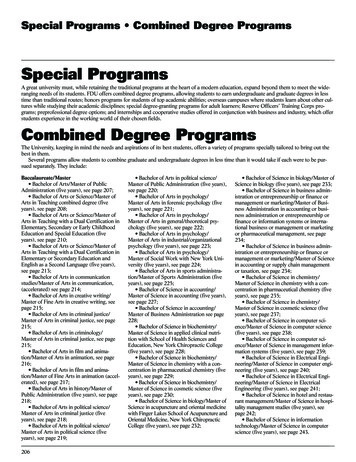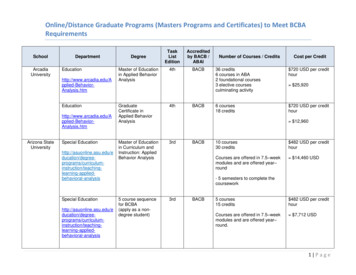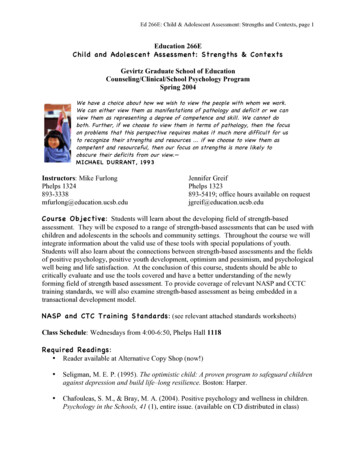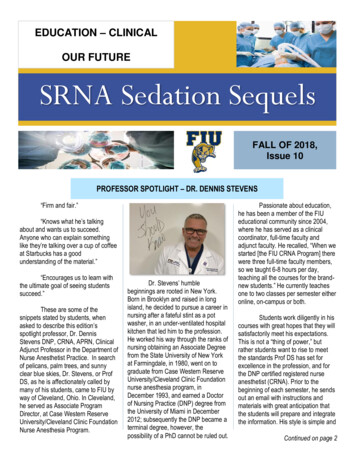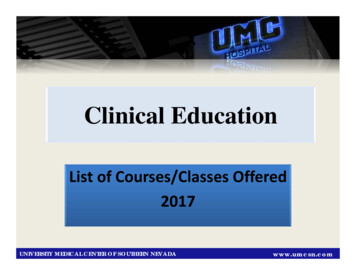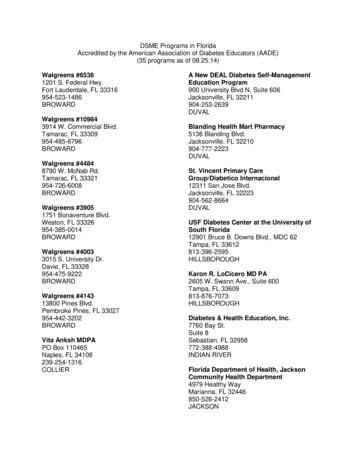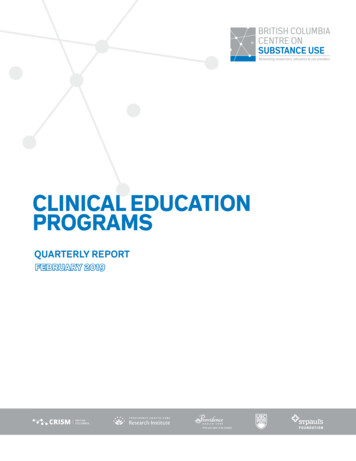
Transcription
Clinical EducationProgramsQUARTERLY REPORTfebruary 2019
Table of ContentsExecutive SummaryIntroduction and BackgroundBCCSU Provincial Opioid Use Disorder Guideline Seminar SeriesIntroductionPurposeOutcomesFeedbackNext stepsOnline Addiction Medicine Diploma Program (Online Diploma dbackNext StepsProvincial Opioid Addiction Treatment Support Program (POATSP)IntroductionPurposeRegistrationInjectable Opioid Agonist Treatment CompletionFeedbackProgram CompletionNurse PractitionersPreceptorsEvaluation SummaryNext StepsInterdisciplinary Addiction Fellowship ProgramIntroductionCurrent FellowsWhat’s New LecturesNext 81919
Executive SummaryOn June 5, 2017, the British Columbia Centre on Substance Use (BCCSU) became responsible for theeducational and clinical care guidance activities for all health care professionals who prescribe medicationsto treat opioid use disorder. To date, all of these educational programs have been very well-received, asdemonstrated by the following key performance metrics: As of February 1, 2019, 2555 clinicians have been reached through 69 Provincial Opioid UseDisorder Guideline Seminars across BC.Over 13,000 people have registered in the Addiction Care and Treatment Online Certificate(formerly called the Online Addiction Medicine Diploma Program) and 2321 have received theircertificate (865 from BC) since it was originally launched in May 2017.Since the free CME-accredited Provincial Opioid Addiction Treatment Support Program waslaunched in July 2017, there have been 2469 registrants and 214 new authorizations to prescribeOAT have been processed.The Interdisciplinary Addiction Fellowship Program is training 27 new clinicians that will helpto lead the treatment of substance use disorders in their communities upon completion of theprogram.A multitude of health care professionals from various disciplines have benefited from each of theabove educational programs, including family physicians, nurses, pharmacists, social workers,and other allied health care professionals (metrics by discipline are provided later in this report).3
Introduction and BackgroundThe current pharmacological treatment options for opioid use disorder includes opioid agonist treatmentssuch as methadone, buprenorphine/naloxone, slow-release oral morphine, and injectable opioid agonisttreatment. However, despite mounting evidence that these treatments are very effective for opioid usedisorder, there are numerous challenges to scaling up access to treatment, including the need to rapidlyincrease the number of providers trained in evidence-based care through interdisciplinary education andtraining programs.In the context of the provincial overdose crisis, the provincial government has identified the need to enhancethe capacity of primary care providers to support and care for individuals in their practice, including generalpractitioners and nurse practitioners. In order to support primary care providers with clinical care guidanceand educational activities, the BCCSU has developed innovative and flexible training models to betterengage clinicians including physicians, nurses, nurse practitioners, pharmacists, social workers, and alliedhealth professionals. This report highlights the following BCCSU training activities: The Provincial Opioid Use Disorder Guideline Seminar Series;The Online Addiction Medicine Diploma Program;The Provincial Opioid Addiction Treatment Support Program; andThe Interdisciplinary Addiction Fellowship ProgramSpecifically, this report provides detailed performance metric data for each program listed above, qualitativefeedback from heath care professionals who have completed the programs, and strategies moving forwardto further expand and improve the educational programs offered by the BCCSU.4
BCCSU Provincial Opioid Use Disorder Guideline Seminar SeriesIntroductionOn February 7, 2017, the BCCSU and the Ministry of Health (MoH) released the Provincial Guideline forthe Clinical Management of Opioid Use Disorder. As of June 5, 2017, this guideline is the official provincialreference tool for all health care professionals in BC involved in treating patients with opioid use disorder. Tosupport the implementation of these new clinical guidelines throughout the province, educational sessionswere necessary to improve knowledge of evidence-based treatment for opioid use disorder among healthcare providers.PurposeThe BCCSU, in partnership withthe Divisions of Family Practiceand regional health authorities,coordinated a number of in-persontraining sessions throughout theprovince to provide an update onthe opioid overdose crisis and reviewthe key recommendations fromthe provincial guidelines. TheseUBC CME accredited sessions werepresented by addiction medicineexperts in partnership with theBCCSU. Content was tailored toeducate and support primary careproviders to incorporate the clinicalmanagement of opioid use disorder,including buprenorphine/naloxone,in their existing practice ratherthan referring out to specialists.The sessions provided opportunitiesfor health care providers to ask anaddiction medicine expert theirquestions and to bring forwardclinical cases for discussion, as wellas to build local networks to supportone another in this important work.The sessions were also a supportiveenvironment to raise anticipatedchallenges, to raise anticipatedchallenges and specific concernswith respect to taking on this work,as well as to hear an expert speak tothese issues.5
OutcomesWhile the majority of session attendees were family physicians, a range of interdisciplinary healthprofessionals also attended, including nurses, specialists, pharmacists, and allied health clinicians. As ofFebruary 1, 2019, 2555 clinicians have been reached through 69 seminars.Sessions per Health Authority(n 69)Attendance by Profession% (n 2555)Vancouver Coastal HealthFraser HealthInterior HealthIsland HealthNorthern HealthOther (webinars)1812171246Family PhysicianSpecialistNurse PractitionerNursing (RN, LPN, RPN)Other67251412LocationsAbbotsfordAshcroftBella CoolaBurnabyCampbell canFernieGabriola IslandGibsonsKamloopsKelownaLangleyLillooetMaple RidgeNanaimoNelsonNorth VancouverPentictonPitt MeadowsPort HardyPrince GeorgeRichmondSalmon ArmSalt Spring VernonVictoriaWhistlerIn addition to the in-person seminars offered to disseminate the guidelines and increaseuptake, the BCCSU has developed a webinar to support and educate clinicians whowere unable to attend in-person sessions held in their area. This two-part webinar ispresented by Dr. Keith Ahamad and Dr. Kit Fairgrieve and can be found on the BCCSUwebsite at www.bccsu.ca/webinars/. The BCCSU will continue to provide seminarsrequested by clinical groups throughout BC. Since the release of these webinars on theBCCSU website, they have accumulated a combined 2,339 views.Additional webinars have also been added to the BCCSU website this quarter tointroduce the new injectable opioid agonist treatment guidelines and to help supportclinicians who have unable to attend in-person iOAT sessions. This three-part webinaris presented by Dr. Nadia Fairbairn and Dr. Scott MacDonald and can be found on theBCCSU website at www.bccsu.ca/webinars/. Since the release of these webinars on theBCCSU website, they have accumulated a combined 484 views.62,339484
“Feedback“After having attended this session, I plan tolook up the OAT online training”– GP, Vancouver Coastal Health Authority“Suboxone and methadone are very effective intreating opioid use disorder and we have manyresources available to us to help.”– GP, Vancouver Coastal Health Authority“Methadone dispensing continues to beextremely challenging and possibly unsafe inthis low-resource setting.”– GP, Rural and Remote“Suboxone is less scary than I thought (but still scary) and worth overcoming myapprehension.”– GP, Rural and Remote“The key pearl I gained from this session is thesafety profile differences between suboxone andmethadone and my role when it comes to OATprescribing ”– GP, Vancouver Coastal Health AuthorityNext StepsWith the upcoming release of the BCCSU’s Guideline for the Clinical Management of Alcohol Use Disorder,developing and coordinating education and training opportunities for health care providers who wish tooffer screening and treatment in their practice has become a priority for the BCCSU. The BCCSU will workin close partnership with the regional health authorities to provide educational and training support on thecontinuum of care for alcohol use disorder, in addition to the ongoing seminars for opioid use disorder.7
Addiction Care and Treatment Online Certificate (formerly Online Diploma)IntroductionEducation and training for health care professionals on the treatment of substance use disordersrepresents a significant unmet need in British Columbia and across Canada. This course guidesparticipants through seventeen modules related to addiction medicine and is meant to help closethe gap between scientific evidence and current clinical practice. The BCCSU aims to help addressthe current lack of support for patients with substance use disorders by providing the educationand tools required to implement change within clinical practice. This program was supported by aninvestment from the Province of British Columbia and the Ministry of Health.PurposeThe Online Addiction Medicine Diploma Program has been redesigned and updated to bringlearners a more interactive and seamless learning experience. The new program is called theAddiction Care and Treatment Online Certificate and has launched in partnership with UBCContinuing Professional Development and the UBC School of Nursing effective February 13, 2019.The Addiction Care and Treatment Online Certificate is a free online certificate course targetedat health care professionals interested in learning more about providing care to patients withalcohol, tobacco, opioid, cannabis and other substance use disorders. This course provides a broadoverview of substance use and each module is informed by theoretical and academic context, withcase discussions and knowledgetesting questions supportingthe learning objectives. Clinicalcases directly applicable topractice help provide real-worldexamples to learn from and theopportunity to apply knowledgegained from the course. Thiscourse now offers a nursingspecific stream to better helpsupport nurses in providing thisimportant care.8
RegistrationSince the course launched in May 2017, a total of 13,084 people are registered in the program as ofNovember 14, 2018.All Registrants by Profession (n 13084)Family PhysicianSpecialistResident/StudentRegistered NurseLicensed Practical NurseRegistered Psychiatric NursePharmacistNurse PractitionerCounsellorSocial WorkerOther7%68186443763113,08447% from BC15% from Alberta9% from Saskatchewan16% from Ontario13% from ElsewhereBC Registrants by Profession*Family PhysicianSpecialistResident/StudentRegistered NurseLicensed Practical NurseRegistered Psychiatric NursePharmacistNurse PractitionerCounsellorSocial WorkerOther7%5131924427532* At this time, we are unable to collect regional registrationinformation due to privacy restrictionsOutcomes2,321 people (865 from BC) have completed the entire course and have receivedtheir Diploma.2,3219
“Feedback“What I learned goes way beyond what I canadequately type here! I have further developedmy client centered, trauma informed practice,and enhanced my medical terminology in regardsto addictions medicine.”– Addiction and Recovery Outreach Worker“I plan to advocate for and work towards theestablishment of an addiction consultationservice in our local acute care center. I also planto advocate for better acknowledgement of theaspects of addiction medicine (particularly harmreduction and treatment) in our provincial healthauthority as we establish new provincial policies.”– Pharmacist“I better understand how to collaborate withother health professionals in the care of patientsand families affected by substance use disorders”– Family Medicine Resident“One of the key barriers in this work as aninpatient physician it that it is often difficult toensure proper follow up, especially if the GP doesnot take on a role for addictions treatmen.”– Internal Medicine Specialist“I will add detailed substance questions to mydiagnostic interviews for adolescents, rather thanglossing over marijuana use.”– Child and Adolescent Psychiatry“Addiction is a chronic medical condition andwe have effective tools in engaging people intocare towards patient-centered priorities, harmreduction, treatment and recovery.”– Addiction Medicine Specialist“There was minimal education in my nursingtraining for substance use disorders, and myprevious role did not require this knowledgeor experience. As I have transitioned intoCommunity Mental Health, there is anexpectation and need for this education. I feelmore equipped to plan for and treat my clientswho struggle with addiction.”– Registered Nurse“I learned to tackle smoking cessation at the sametime, communication tools to address substanceuse issues in patients, and managing alcoholwithdrawal in an outpatient setting.”– GP“I learned about safe prescribing and theusefulness and efficacy of different medications,which will help me to better understand theneeds of the people I work with who usesubstances and are trying out meds and ormanaging pain.”– CounsellorNext StepsIn addition to the new content offered in the relaunch of this program, the BCCSU will be adding moremodules into the program over the coming months. This includes topics such as psychosocial inventions,recovery, LGTBQ , pregnancy, and youth with substance use disorders.10
Provincial Opioid Addiction Treatment Support Program (POATSP)IntroductionIn June 2017, the BCCSU becameresponsible for the clinical careguidance and education and trainingpathways for prescribers of opioid usedisorder treatment in BC. In the midstof a provincial overdose crisis, BritishColumbia made concerted effortsto address gaps in the provision ofevidence-based treatment options andcare for individuals with opioid use disorder, including the development of provincial guidelines (BCCSU/MoH Guidelines for the Clinical Management of Opioid Use Disorder) and the creation of an aligned trainingprogram, the Provincial Opioid Addiction Treatment Support Program (POATSP). This comprehensivetraining program includes education and training on prescribing OAT, including buprenorphine/naloxone,methadone, slow-release oral morphine, and injectable opioid agonist treatments (hydromorphone anddiacetylmorphine). As of February 14, 2018, nurse practitioners in British Columbia can also prescribe thefull range of opioid agonist treatments (please see the CRNBC website for more information).PurposeThe target audience for the program is opioid agonist treatment prescribers, including both physiciansand nurse practitioners; however, all health care providers (e.g., nurses, pharmacists, social workers,counsellors) can benefit from the online education modules. The full course is divided into 25 modules andtakes approximately 8-10 hours to complete. For physicians and nurse practitioners interested in prescribingOAT, the BCCSU also provides a workbook with clinical cases to practice prescribing and application ofclinical judgement. The workbook helps to solidify some of the key points in the online course and ensuresthe learner has a good foundation before an in-person preceptorship. The BCCSU mandates the completionof a preceptorship of at least two half-day sessions before prescribing oral OAT.11
RegistrationSince the program officially launched on July 10, 2017, the following are registration numbers for thePOATSP effective January 9, 2019:Registrants by Profession (n 2469, 1962 from BC) Registrants by Health AuthorityFamily PhysicianSpecialistRegistered NursePharmacistNurse PractitionerOther Allied HealthOtherResponses for Other: FP Resident, LPN, Resident,Medical Student, Student Nurse, MOA, Pharmacy Tech, Reg Psychiatric Nurse, Support/SocialWorker, Addiction Counsellor, Addiction MedicineFellow, Reg Pharm Tech23%6161510624First Nations HealthFraser HealthInterior HealthIsland HealthNorthern HealthProvidence Health CareProvincial Health ServicesVancouver Coastal HealthN/A6%1311105541531The vast majority of registrants in the POATSP currently reside inBritish Columbia (80% from BC and 20% out of province), but asthe BCCSU continues to collaborate with other provinces on clinicaleducation for opioid use disorder, we expect to see a rise in out-ofprovince registrants.An advantage of the new platform is that learners can now register and completethe entire course online, removing access barriers especially for those in ruraland remote areas. Prior to July 2017, the provincial program offered upwardsof 4 in-person training sessions per year. On average, registration in the inperson sessions was approximately 140 registrants per year. In one year, thenew online learning platform has increased registration by 1,090%.121,090%
Injectable Opioid Agonist Treatment CompletionThe iOAT training module, released by the BCCSU in December 2017, is tailored for experienced oral OATprescribers who wish to prescribe this higher-intensity treatment to their patients. This iOAT module can becompleted on its own or incorporated as part of the online training for new OAT prescribers. All clinicianswho wish to prescribe iOAT for opioid use disorder will need to complete a Collaborative PrescribingAgreement (CPA) that will be jointly signed by the BCCSU and prescriber and subsequently sent to theMinistry of Health for activation in PharmaNet. The CPA is provided upon completion at minimum, 1 halfday preceptorship.Since the program launched in December of 2017, 27 physicians and 3 nurse practitioners have fullycompleted the iOAT training program and can prescribe this treatment option.13
One of the strengths of the POATSP is the flexibility with course progression and module selection. Learnersmay take individual modules in any order they choose and explore other content that may not have been partof the stream they originally selected. The below images provide graphical representation of the completedmodules for those who finished the course (in any stream) as well as the percentage of registrants whodownloaded supplemental resources. From this data, we can see that approximately 5% of registrants whocompleted the program, chose to complete the buprenorphine/naloxone only components. Further, nearly80% of all learners who have completed the online course took the iOAT module.14
“Feedback“More cases and questions to practice myknowledge are always appreciated!”“I thought this course material, layout, andinformation was excellent. I still need theexperience in prescribing but the knowledgecontained in the modules has provided me withthe foundation.”“Great course, very interactive and thorough.Good practice review questions to assist withcomprehension of the material.”“It was very useful and practical informationsuited to our current BC situation.”“I greatly enjoy this semi-interactive format oflearning; it encourages critical thinking aboutthe concepts being taught and helps to engageinterest. The ability to check your knowledge andreceive immediate feedback us rewarding andencourages continued study.”“I really enjoyed this course and wish morepeople knew about it. I really liked the way itwas designed, the actual layout and the sectionswere great to go through. It felt a bit long butneccessary. I like the quizzes to keep on track aswell.”“I would like to see more focus on the multidisciplinary team (e.g nurses).”Program CompletionCompleting this course is the first step in theauthorization to prescribe opioid agoni
Continuing Professional Development and the UBC School of Nursing effective February 13, 2019. The Addiction Care and Treatment Online Certificate is a free online certificate course targeted at health care professionals interested in learning more about providing care to patients with
